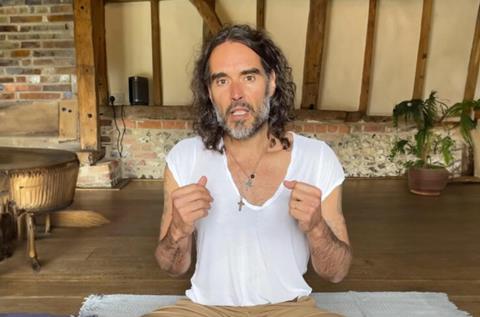The controversial comedian’s baptism does not change his past or exempt him from facing the consequences of his previous actions, but God only knows the sincerity of his conversion. It is not for Christians to judge, says Krish Kandiah

There are a lot of unlikely conversions in the Bible – a Samaritan sorcerer and an Ethiopian eunuch (Acts 8) and a Roman centurion (Acts 10), for a start. The Bible makes it clear that it was not always easy for other people to accept those who professed conversion.
When Ananias was asked to go and encourage Saul, Ananias felt it was important to remind the omniscient God that the man was on a murderous mission to wipe out Christians (Acts 9). When a woman with a questionable past came to Jesus and washed his feet, witnesses were shocked that Jesus would allow her anywhere near him (Luke 7).
So perhaps it is not surprising that there have been mixed reactions to the recent baptism of controversial comedian and actor Russell Brand.
Complicated faith
Some have questioned the timing of his new-found faith, with Brand most recently in the headlines because of serious allegations of sexual assault. The comedian has been questioned twice by police, and investigations are still ongoing. But he has not been charged and Brand denies the accusations, maintaining that his relationships were always consensual.
However, neither the timing nor the activating circumstances can prove or disprove the authenticity of faith. For many people, faith is born from tragedy, trauma or trouble. These tough times are very good at waking us up to our need for forgiveness and redemption.
Some have suggested that Brand’s baptism might be an attempt to avoid legal repercussions, but God’s unconditional forgiveness of those who trust in him does not guarantee unconditional forgiveness by others also.
When Jesus famously offered salvation to a man who had been found guilty of a capital offence and was hanging on a cross next to him, the newly converted thief was not spared his sentence. His execution continued and he died within hours. What was important to him was not a reprieve, but the hope that came with Jesus’ promise that “today, you will be with me in paradise” (Luke 23:43).
Some have questioned Brand’s commitment, because he has tried so many different ways to find meaning in his life. He is very open about the fact that he is a recovering drug and sex addict and has explored Buddhism and other forms of spirituality over the years.
God only knows
Only time will tell whether this is just a fad. Only God knows if there has been an authentic change of heart. Meanwhile his quest for fulfilment probably mirrors that of many around us and, as such, his testimony may encourage others to look into the Christian faith also.
Brand says: “People are cynical about the increasing interest in Christianity and the return to God, but to me, it’s obvious…As meaning deteriorates in the modern world, as our value systems and institutions crumble, all of us become increasingly aware that there is this eerily familiar awakening and beckoning figure that we’ve all known all of our lives, within us and around us.”
Brand has said that baptism, for him, was a an “opportunity to leave the past behind.” There is truth in this assertion. Saul, the converted persecutor of Christians, after he had been re-branded as Paul, the apostle, author, missionary and leader of the early Church, said something similar: “Don’t you know that all of us who were baptised into Christ Jesus were baptised into his death? We were therefore buried with him through baptism into death in order that, just as Christ was raised from the dead through the glory of the Father, we too may live a new life” (Romans 6:3-4).
Baptism is a visible reminder of the fresh start that we all long for and need. Whatever we have or haven’t done or said, and whatever has or hasn’t been said or done to us, we are all equally in need of a new start.
God’s unconditional forgiveness of those who trust in him does not guarantee unconditional forgiveness by others
We don’t need to have as tumultuous a past as Brand to crave that new beginning. We don’t need to have as public a platform. Whoever we are, however we’ve lived and whenever we choose to turn to God, we are offered a free welcome into his family.
Baptism is also a reminder that those of us who have tasted the grace of God cannot look on another person and judge them. Brand’s baptism is not a mandate for us to question his sincerity. Instead, it is an opportunity to remember that the God we follow delights to save the unlikeliest of people.
As Paul himself wrote in the words that have inspired so many people throughout history: “Here is a trustworthy saying that deserves full acceptance: Christ Jesus came into the world to save sinners—of whom I am the worst (1 Timothy 1:15).
As I pray for Brand, I am drawn to the story of the woman at the well. Here was someone who could not walk down the street without people judging and criticising, who had spent their life trying to quench their thirst for spiritual fulfilment with things that could never provide it.
Perhaps she, too, was accused of turning to Christianity as just another desperate attempt to find peace and fulfilment. Whatever others said to and about her, Jesus treated her with great grace. In fact, in John’s Gospel, she is the one to whom he chooses to reveal his identity as the promised Messiah.
We are told that many of the Samaritans in the town where she lived believed in Jesus because of the woman’s testimony. I pray that many people will listen to Brand’s testimony and make a decision for themselves not whether he is the real deal, but whether Jesus is the real deal.






































No comments yet